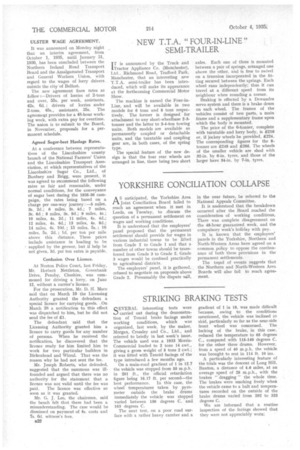STRIKING BRAKING TESTS
Page 36

If you've noticed an error in this article please click here to report it so we can fix it.
SEVERAL interesting tests were carried out during the demonstration of Tenoid brake facings under working conditions, which was organized, last week, by the maker, Morgan, Crossley and Co., Ltd., and referred to briefly in last week's issue. The vehicle used was a 1933 MorrisCommercial loaded to 2 tons 14 cwt., giving a gross weight of 5 tons 2 cwt.; it was fitted with Tenoid facings of the type introduced a few months ago.
On a main-road gradient of 1 in 12.7 the vehicle was stopped from 55 m.p.h. in 201 ft., the official retardation figure being 16.17 ft. per second-the best performance. In this case, the wheel temperatures taken by pyrometer outside the brake drums immediately the vehicle was stopped varied between 130 degrees C. and 163 degrees C.
The next test, on a poor road surface with a rather heavy camber and a
gradient of 1 in 18, was made difficult because, owing to the conditions mentioned, the vehicle was inclined to skid, particularly so far as the near-side front wheel was concerned. The locking of the brake, in this case, reduced the temperature to 65 degrees C., compared with 115-140 degrees C. for the other three drums. However, from a speed of 40 m.p.h. the vehicle was brought to rest in 114 ft. 10 ins.
A particularly interesting feature of the trials was the descent of Long Hill, Buxton, a distance of 4.6 miles, at an average speed of 28 m.p.h., with the brakes " dragging" the whole time. The brakes were smoking freely when the vehicle came to a halt and temperatures recorded on the outside of the brake drums varied from 292 to 325 degrees C.
We are informed that a routine inspection of the facings showed that they were not appreciably worn:




























































































